
- •In the year of 2008 Oxford had the largest number of (5) _________________ (science) research works in a total of 48 fields.
- •In the city of Kuibyshev
- •I order:
- •Valentina Tereshkova is the first woman to fly in space in 1963.
- •10 Facts about the United States:
- •Informal letters are characterized by:
Valentina Tereshkova is the first woman to fly in space in 1963.
She didn’t (1)finish a university, because she had to help her mother support the family. She was a textile worker when she was selected (2)to take part in the Soviet Union cosmonaut program in 1962. She was the first cosmonaut who was not a pilot. She was (3)chosen mainly (4)because of her experience with parachute jumping. She had made more than a hundred jumps.
After 18 months of training, Tereshkova's Vostok 6 spacecraft was launched. On June 16, 1963 she went into orbit and in about 80 hours (more than three days) completed 48 orbits before returning to Earth. She parachuted from her (5)spacecraft as it fell to Earth. That is how the Vostok spacecraft (6)worked.
Her colleagues said that she (7)earned respect because of her enthusiasm and ambition, besides, she had great (8)organizational skills.
Tereshkova never flew in space again. She served in the Soviet parliament for a while.
(edited from http://www.astronautix.com)
b)Translate the text into Russian.
|
You should remember the following words and phrases!
| |
|
to participate |
принимать участие |
|
managerial abilities |
организаторские способности |
|
decision-making |
принятие решений |
|
to deserve the credits |
заслужить уважение |
|
a weapon |
оружие |
|
space exploration |
освоение космоса |
|
to appoint |
назначать |
|
jet propulsion |
реактивное движение |
|
Deputy Chief |
заместитель директора |
|
cruise missile |
крылатая ракета |
|
manned vehicle |
пилотируемое транспортное средство |
|
to launch |
запускать |
|
space booster |
ракета-носитель |
|
artificial Earth satellites |
искусственный спутник Земли |
|
an interplanetary probe |
межпланетная зондирующая ракета |
|
authorities |
власти |
|
guidance |
руководство |
|
to operate |
работать, управлять |
|
to make contribution |
сделать вклад |
|
publically recognized |
признанный |

Active voice – The subject performs the action
The group of engineers launched the spacecraft.
Passive Voice – The subject receives the action
The spacecraft was launched by the group of engineers.
Passive Voice is used when it is more important to stress the thing done rather than the doer, or when the doer is unknown. If the doer of the action or the instrument is mentioned, it is preceded by BY or WITH respectively.
|
Tense |
Form in Active Voice |
Form in Passive Voice |
|
Present Simple |
V1, Vs /-,? do(does) |
am/is/are +V3 |
|
Present Continuous |
am/is/are +Ving |
am/is/are +being+V3 |
|
Present Perfect |
have/has+V3 |
have/has+been+V3 |
|
Present Perfect Cont. |
have/has +been+Ving |
- |
|
Past Simple |
V2(ed) /-/? did |
was/were + V3 |
|
Past Continuous |
was/were + Ving |
was/were + being + V3 |
|
Past Perfect |
had + V3 |
had + been + V3 |
|
Past Perfect Cont. |
had + been +Ving |
- |
|
Future Simple |
shall/will + V1 |
shall/will + been + V3 |
|
Future Continuous |
shall/will + be + Ving |
- |
|
Future Perfect |
shall/will + have + V3 |
shall/will + have + been + V3 |
|
Future Perfect Cont. |
shall/will + have + been + Ving |
- |
1. In the text (p. 3), underline all the predicates. Define the Voice.
2. Transform the Active Voice into Passive and vice versa.
a) Authorities have appointed Mr. Simon Deputy Chief of the space exploration program.
b) SSAU is publically recognized as the leading technical university in Russia.
c) I’m sure that our new manager will make a great contribution to the success of our organization.
d) The first artificial earth satellite was launched in 1957.
e) The team of engineers is testing the weapon at the moment.
f) The surface of the Moon has been explored by the interplanetary probes.
g) A new project will be presented by this research group.
h) In 1926 Korolev transferred his documents to the engineering college in Moscow.
i) Rocket weapons are being controlled by the leaders of the European Union.
j) Every year enthusiasts organize a research club in the laboratory.
3. Read the following text and out the verbs in brackets into the correct form of Active or passive Voice
“One small step for man, one giant leap for mankind”
In July 20, 1969 Neil Armstrong (1)__________ (to say) "one small step for man, one giant leap for mankind". This was the day that men from the Earth first (2)__________ (to land) on the Moon. It was the culmination of years of research and development.
Neil Armstrong was born August 5, 1930 on a farm in Wapakoneta, Ohio. Neil (3)__________ (to work) at the local airport. After starting flying lessons at the age of 15, he (4)__________ (to give) a pilots license on his 16th birthday, before he had earned a driver's license.
Armstrong (5)__________ (to send) to Naval Air Station in Florida in 1949 before he (6)__________ (to graduate) from the university. He then (7) __________ (to flow) 78 combat mission in Korea, earning three medals, including the Korean Service Medal. Armstrong, being an engineer by training, (8)__________ (to criticize) by some of the non-engineering pilots, that his flying technique was too mechanical.
Then in September of 1963 he (9)__________ (to select) as the first American civilian to fly in space. Later Armstrong (10)__________ (to appoint) Command Pilot of the Apollo 11, which (11)__________ (to touch) down on the surface of the Moon on July 20, 1969. The American flag (12)__________ (to plant) on the surface by Neil Armstrong and Buzz Aldrin.
The astronauts (13)__________ (to return) to the Earth on July 24, 1969. Armstrong and Aldrin (14)__________ (to award) the Presidential Medal of Freedom.
(edited from http://space.about.com)
4. Translate the following sentences from Russian into English.
a) Ежегодно сотни исследовательских групп создаются властями для освоения космоса.
b) Первый пилотируемый космический аппарат был запущен 12 апреля 1961 года.
c) Этот молодой конструктор будет назначен заместителем руководителя группы по исследованию реактивного движения.
d) Проект по созданию нового ракетного оружия будет завершен к концу этого года.
e) Огромный вклад в развитие ракетно-космических технологий был сделан советскими космонавтами Юрием Гагариным и Владимиром Комаровым.
f) Русские были признаны первой нацией в мире, совершающей космические полеты.
g) Благодаря энтузиазму и организаторским способностям С.П. Королева крылатые ракеты, пилотируемые космические аппараты, ракеты-носители, искусственные спутники земли и межпланетные зондирующие ракеты были сконструированы и произведены в Советском Союзе.
h) Термин «пилотируемый» значит, что транспортное средство управляется человеком.

1. a) Work in groups of 2-3 people. Make a report on the biography of a famous cosmonaut or a designer and the contribution they made into the development of space exploration. You may choose to speak about:

K
 onstantin
Tsiolkovsky
onstantin
TsiolkovskyKathryn Thornton
Buzz Aldrin
V
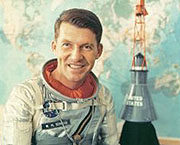 ladimir
Komarov
ladimir
KomarovYury Gagarin
Valentin Glushko
Any other scientist you consider important
b) Choose one speaker from the group and make a two-minute presentation in the name of this person.
c) Prepare at least two questions to the other speakers.
![]()
By making notes you actively process and interpret ideas and information. This aids concentration and understanding so you learn more. Notes help identify main points and organize your ideas into a logical order.
1. Key words and phrases provide instructions about what to do; trigger your memory; lead on to other ideas / explanations. They must be easy to find within your notes. Highlight such words in the following text.
I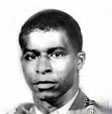 n
June l967,Robert
Henry Lawrence, Jr.
was named the first
African-American astronaut,
though he never
made it into space.
Several months later, on December 8, Lawrence died
when his F-104 Starfighter jet, in which he was a co-pilot/passenger
during a training flight, crashed
at Edwards Air Force Base, California.
n
June l967,Robert
Henry Lawrence, Jr.
was named the first
African-American astronaut,
though he never
made it into space.
Several months later, on December 8, Lawrence died
when his F-104 Starfighter jet, in which he was a co-pilot/passenger
during a training flight, crashed
at Edwards Air Force Base, California.
Robert Henry Lawrence, Jr. was born October 2, 1935, in Chicago. He received an undergraduate degree in chemistry from Bradley University in 1956, and was commissioned a Second Lieutenant into the US Air Force upon graduation at age 20. Lawrence later earned a Ph.D. in physical chemistry in 1965 from Ohio State University.
Robert Henry Lawrence, Jr. distinguished himself as an exceptional Air Force test pilot and was among the first to be named to the USAF Manned Orbiting Laboratory (MOL) program, which was a precursor to today's successful NASA space shuttle program.
In 1997, thirty years after his tragic death, the Chicago native son's name was the 17th added to The Astronauts Memorial Foundation Space Mirror. The mirror was dedicated in 1991 to honor all US astronauts who have lost their lives on space missions or in training for missions.
(taken from http://space.about.com)
2. Always write a heading or title to your notes. Give titles to the 4 paragraphs above.
3. Write notes in a logical order to show how ideas are related. The notes may be of two types: linear and patterned. Choose the one to your liking and complete it.
Linear Patterned
I .
Brief Information
.
Brief Information
 a) First Afro-American astronaut
a) First Afro-American astronaut


 b) never made it to space
b) never made it to space
 c) died in a crash
c) died in a crash
I



 I.
Education
I.
Education
a)…
…



4. Develop your own 'shorthand' using abbreviations and symbols. The following abbreviations could be useful:
e.g. – for example etc – and so on
i.e. – that is so, therefore
< - less that aka – also known as
> - greater that
5. Make note on the text about S.P. Korolev (p.3) using the techniques above.
6. Be brief, but not so brief that your notes don't make any sense. You will need to read your notes in the future and should be able to understand what you have written. Be ready to retell the text about S.P. Korolev using the notes you have made.

![]()
1. We have asked some foreigners what ideas of Russia they have (the answers are from a real Internet forum). Say which of them you agree/ disagree/ find common / surprising/shocking. Make your comments.
‘People there are very good-looking, all of them are blond. Have a look at Putin, for example!’ (China)
‘Russians love drinking vodka! P.S. Don’t worry about stereotypes, most people think that in Brazil there is only samba. I HATE samba!’ (Brazil)
‘My teacher once said that in Russia it is not a crime if husband would kill his wife. I don’t believe it, though.’ (Great Britain)
‘Cold - yeah that would be the first thing that comes to mind.’ (Trinidad and Tobago)
‘The streets are not safe from gangs and armed men.’ (Egypt)
‘hmm Stalin? :) sorry joke…I think you are good at teams sports like volleyball or basketball… football of course too.’ (Poland)
‘Russians always eat rye bread with herring.’ (Netherlands)
‘I hate Russian fashion, because there is lots of fur! Haven’t you heard of Green Peace, guys??’ (United States)
‘Russian children dream of leaving the country as soon as they are 18.’ (Germany)
‘People from Russia are very hospitable. If they invite you, you can be sure of a big welcome!’ (Italy)
![]()
1 a) Match the following geographic features with their Russian equivalents.
|
1 |
a)океан |
|
2. country |
b)река |
|
3. city |
c) континент |
|
4. ocean |
d)озеро |
|
5. sea |
e)страна |
|
6. river |
f)пустыня |
|
7. lake |
g)город |
|
8. steppe [step] |
h)гора |
|
9. plain |
i)море |
|
10. forest |
j)равнина |
|
11. desert [‘dezƏt] |
k)лес |
|
12. mountain |
l)степь |
|
13. island [‘aılƏnd] |
m) канал |
|
14. peninsula [pƏ’nınsjƏlƏ] |
n)остров |
|
15. canal [kƏ’næl] |
o)полуостров |
|
16. tundra[‘t˄ndrƏ] |
p) тундра |
|
17. taiga[‘taıgƏ] |
q)тайга |
b) Name the geographical features you can see on the map below.
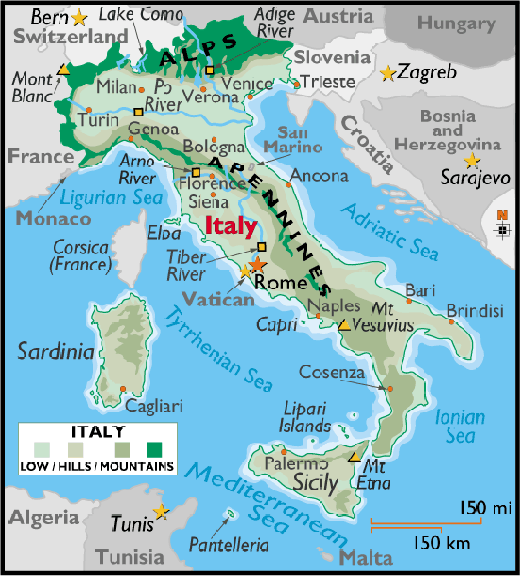
2. Practise reading the following words and geographic names.
|
the Russian Federation |
ðƏ r˄ʃn feder’eıʃn |
|
Europe |
‘juƏrƏp |
|
Asia |
eıʒƏ |
|
the Pacific |
ðƏ pƏ’sıfik |
|
the Arctic |
ðı a:ktık |
|
the Atlantic |
ðı Ət’læntik |
|
China |
tʃaınƏ |
|
Mongolia |
mɒŋ’gƏulıƏ |
|
Korea |
kƏ’ri:Ə |
|
Kazakhstan |
.kæzæk’sta:n |
|
Georgia |
‘ʤɔ:ʤƏ |
|
Azerbaijan |
.æzƏbaı’ʤa:n |
|
Norway |
‘nɔ:weı |
|
Finland |
‘fınlƏnd |
|
the Baltic States |
ðƏ bɔ:ltık steıts |
|
Belorussia |
.belƏu’r˄ʃƏ |
|
Ukraine |
ju:’kreın |
|
Siberia |
saı’bıƏrıƏ |
|
the Urals |
ðı juƏrƏlz |
|
the Caucasus |
ðƏ ‘kɔ:kƏsƏs |
|
the Altai |
ðı a:l’taı |
|
the Volga |
ðƏ ‘vɒlgƏ |
|
the Caspian Sea |
ðƏ kæspıƏn si: |
|
the Ob |
ðı ɒb |
|
the Yenisey |
ðƏ jini’seı |
|
the Lena |
ðƏ ‘leınƏ |
|
the Amur |
ðı Ə’muƏ |
|
the Far East |
ðƏ .fa:r’i:st |
|
Lake Baikal |
leık ‘baıka:l |
|
Moscow |
‘mɒskƏu |
|
occupy |
‘ɒkjƏpaı |
|
surface |
‘sɜ:fıs |
|
scenery |
‘si:nƏrı |
|
climate |
‘klaımƏt |
|
temperate |
‘tempƏrƏt |
|
legislative |
‘leʤıslƏtıv |
|
executive |
ig’zekjƏtıv |
|
judicial |
ʤu:’dıʃl |
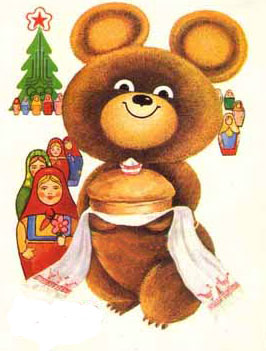
NB!
|
the with geographical names | |
|
The is used before |
The is omitted before |
|
|
3. Read the text about Russia. Complete the table.
|
Location |
|
|
Total area |
|
|
Lowland/Highland |
|
|
Water Resources |
|
|
Natural Resources |
|
|
Population |
|
|
Political System |
|
|
Capital |
|
|
Colours of the flag |
|
T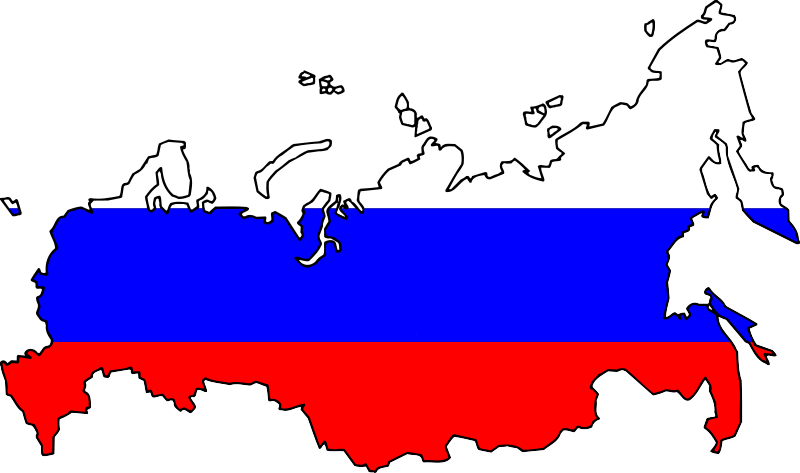 he
Russian Federation
he
Russian Federation
The Russian Federation is the largest country in the world. It occupies about one-seventh of the earth's surface. It covers the eastern part of Europe and the northern part of Asia. Its total area is about 17 million square kilometers. The current population of Russia is 142 million of people.
T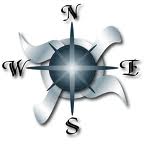 he
country is washed by 12 seas of 3 oceans: the Pacific, the Arctic and
the Atlantic. In the south Russia borders on China, Mongolia, Korea,
Kazakhstan, Georgia and Azerbaijan. In the west it borders on Norway,
Finland, the Baltic States, Belorussia and Ukraine. It also has a
sea-border with the USA.
he
country is washed by 12 seas of 3 oceans: the Pacific, the Arctic and
the Atlantic. In the south Russia borders on China, Mongolia, Korea,
Kazakhstan, Georgia and Azerbaijan. In the west it borders on Norway,
Finland, the Baltic States, Belorussia and Ukraine. It also has a
sea-border with the USA.
There is hardly a country in the world where such a variety of scenery and vegetation can be found. We have steppes in the south, plains and forests in the midland, tundra and taiga in the north, highlands and deserts in the east.
There are two Great Plains in Russia: the Great Russian Plain and the West Siberian Lowland. There are several mountain chains on the territory of the country: the Urals, the Caucasus, the Altai and others. The largest mountain chain, the Urals, separates Europe from Asia.
There are over two million rivers in Russia. Europe's biggest river, the Volga, flows into the Caspian Sea. The main Siberian rivers — the Ob, the Yenisey and the Lena — flow from the south to the north. The Amur in the Far East flows into Pacific Ocean. Russia is rich in beautiful lakes. The world's deepest lake (1600 meters) is Lake Baikal. It is much smaller than the Baltic Sea, but there is much more water in it. Russia has one-sixth of the world's forests. They are concentrated in the European north of the country, in Siberia and in the Far East.
On the vast territory of the country there are various types of climate, from arctic in the north to subtropical in the south. In the middle of the country the climate is temperate and continental.
Russia is very rich in oil, coal, iron ore, natural gas, copper, nickel and other mineral resources.
Russia is a parliamentary republic. The Head of the State is the President. The legislative powers are exercised by the Duma. The executive power belongs to the Government and the judicial – to the System of Courts.
The capital of Russia is Moscow. It is its largest political, scientific, cultural and industrial centre. It is one of the oldest Russian cities.
At present, the political and economic situation in the country is rather complicated. There are a lot of problems in the national economy of the Russian Federation. But in spite of the problems Russia is facing now, there are a lot of opportunities for this country to become one of the leading countries in the world.
4. Match the following words with their definitions. Define the part of speech.
|
1 |
a) beautiful natural environment |
|
2 to occupy |
b) to divide into parts |
|
3. scenery |
c) top part of something |
|
4. vegetation |
d) liquid used as a fuel |
|
5. to separate |
e) to use a place or period of time |
|
6. lowland |
f) plants |
|
7. oil |
g) black substance, burnt to get heat |
|
8. coal |
h) flat land, same level as sea |
5. a) Match adjectives with nouns to make meaningful collocations.
|
1 |
a) resources |
|
2. vast |
b) economy |
|
3. natural |
c) area |
|
4. mineral |
d) climate |
|
5. parliamentary |
e) territory |
|
6. executive |
f) country |
|
7. complicated |
g) gas |
|
8. national |
h) power |
|
9. leading |
i) republic |
|
10. temperate |
j) population |
|
11.current |
k) situation |
b) Fill in the gaps with the collocations above.
Canada occupies most North America. It is the world's second largest country by (1)_______________after Russia. The (2)_______________ of Canada provides a wide variety of climates throughout the country. For example, Coastal British Columbia enjoys a (3)_______________, while Prairie provinces experience a continental one. Canada is a (4)_______________. Its strong democratic traditions have made it one of the (5)_______________ in the world though it had a (6)_______________ with the British Monarchy during World War II. The (7)_______________ is directed by the Cabinet of ministers.
The (8)_______________ is 32 million people, including English (21%), French (15.8%), Scottish (15.2%), Irish (13.9%), German (10.2%), Italian (5%), Chinese (3.9%), Ukrainian (3.6%),etc. Canada's two official languages are English and French. Canada is one of the world's wealthiest nations. Agricultural products play an important part in the (9)_______________. Canada is also a global source of many (10)_______________, such as gold, nickel, aluminium, and (11)_______________.
6.a)Fill in the gaps with the following prepositions.

a) Japan is a country of over three thousand islands washed (1)_____ the Pacific Ocean.
b) Japan doesn’t border (2)_____ any countries because it is an island.
c) Japan is rich (3)_____ gold, magnesium, and silver, though it is dependent on foreign sources for many of the minerals.
d) The Shinano River is the longest river in Japan flowing (4)_____ the Sea of Japan at Niigata City.
e) Most of the population is concentrated (5)_____ Tokyo because of education and job opportunities.
f) Japan is an island, but it belongs (6)_____ the continent of Asia.
g) The legislative power is exercised (7)_____ the Diet of Japan.
b) Put all possible questions to the sentences above.
|
You should remember the following words and phrases!
| |
|
to occupy |
занимать |
|
to cover |
покрывать |
|
a surface |
поверхность |
|
scenery |
пейзаж |
|
vegetation |
растительность |
|
highland |
высокогорье |
|
lowland |
низменность |
|
temperate |
умеренный |
|
oil |
нефть |
|
coal |
уголь |
|
iron ore |
железная руда |
|
natural gas |
природный газ |
|
copper |
медь |
|
mineral resources |
природные ископаемые |
|
legislative |
законодательный |
|
executive |
исполнительный |
|
judicial |
судебный |
|
to border |
граничить |
|
to flow into |
впадать (о реке) |
|
to exercise |
исполнять, осуществлять |

We use the comparative degree to compare one person with another. We often use than after a comparative.
We use the superlative degree to compare one person or thing with more than one of the same group. We often use of or in after a superlative.
|
Regular Comparative and Superlative Forms | |||
|
adjectives |
positive |
comparative |
superlative |
|
of one syllable add –(e)r/-(e)st to form their comparative and superlative forms |
cold big safe |
colder than bigger than safer than |
the coldest (of/in) the biggest (of/in) the safest (of/in) |
|
of two syllables ending in –ly,-y,-w also add –er/-est |
busy shallow |
busier than shallower than |
the busiest (of/in) the shallowest (of/in) |
|
of two or more syllables take more/most |
famous incredible |
more famous than more incredible than |
the most famous (of/in) the most incredible (of/in) |
Certain adjectives form their comparative and superlative in both ways, either by adding –er/-est to the positive form or by taking more/most. Some of these are: clever, common, cruel, friendly, gentle, narrow, pleasant, polite, shallow, simple, stupid, quiet.
There are several exceptions
|
positive |
comparative |
superlative |
|
good |
better |
the best |
|
bad |
worse |
the worst |
|
little |
less |
the least |
|
many/much |
more |
the most |
|
far |
farther/further |
the farthest/furthest |
1. In the text (pp. 4-5), underline all the adjectives. Define the degree of comparison.
2. Open the brackets with the suitable degree of comparison.
a) Greenland is (large) island in the world.
b) Travelling by plane is (fast) than travelling by train.
c) Boracay Island in the Philippines has (good) beaches I have ever seen.
d) Jamaica is (sunny) than Norway.
e) Fjordland in New Zealand is (wet) place in the world.
f) Rain in the wet season is (heavy) than during the rest of the year.
g) Easter Island is (interesting) island I have ever visited.
h) A holiday in Thailand is (exciting) than a holiday in Spain.
i) Santa Cruz is the second (large) island in the Galapagos.
j) The Galapagos are one of (expensive) places in the world to visit.
3. Fill in the gaps with the adjectives from the box below. Choose the right degree of comparison.


 .
continent
.
continent .
surface
.
surface .
total
.
total